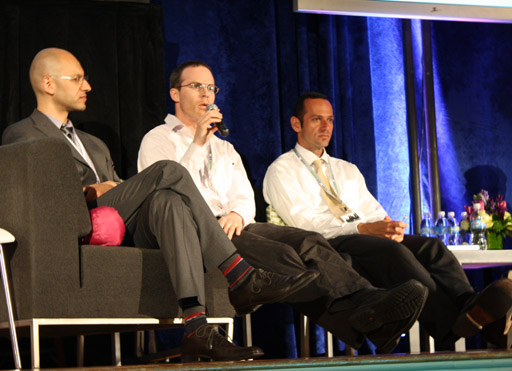 "I think what's missing from a lot of these mobile [health] demos is the patient-doctor interaction," Kaiser Permanente's Ted Eytan said during an interview on the sidelines of the Health 2.0 conference earlier this month. "If my doctor recommended a mobile service and said, 'Hey, I've looked at this and I think it would be useful,' then I'd be more likely to use it."
"I think what's missing from a lot of these mobile [health] demos is the patient-doctor interaction," Kaiser Permanente's Ted Eytan said during an interview on the sidelines of the Health 2.0 conference earlier this month. "If my doctor recommended a mobile service and said, 'Hey, I've looked at this and I think it would be useful,' then I'd be more likely to use it."
As we have noted in the past, Kaiser Permanente recently announced plans to roll out a nationwide text messaging appointment reminder option for its patients and has also surpassed 3 million users of its online personal health record. Of course, the mobile platform offers much more than convenient appointment reminders, but Eytan said Kaiser has no plans to push tech for tech's sake.
The most successful mHealth services will be the ones that leverage text messaging technology, Eytan explained, but developers of these services still need to work hard to make them easy to use. Just because SMS is a straightforward service, doesn't mean applications built on top of it will be. Eytan gave up on using Google's SMS query service because he found it too difficult to use.
"The thing about SMS, though, is that it's common to everyone," Eytan said. "A lot of these iPhone services are too complicated, maybe there are some easier to use apps out there, but, overall, the key will be using SMS to push and pull health data and information."
During a panel session at Health 2.0 that Eytan was a part of, DiabetesMine founder Amy Tenderich noted that mobile phone based applications are a lot easier to use than desktop ones if the app requires users to keep a log or take frequent notes throughout the day. One important caveat that Tenderich made was that few people with chronic conditions want to be reminded that they have the condition all throughout the day -- these services need to be more seamless.
"I agree that mobile is perfect for when you are out and about," Eytan told me during the interview following the panel session. "It comes back to getting that information in a useful way -- right when you need it. What Kaiser Permanente is very good at is taking really large systems and making them very accessible and flexible, which is something a lot of Health 2.0 companies can't do as well. We watch some of the mobile [health] demos going on and try to take what we can learn from them and apply it to our own system," Eytan continued, "but our goal, of course, is always to improve the interaction between patient and doctor in order to improve medical care."
For more of Eytan's thoughts on healthcare innovation, check out his personal blog here.














